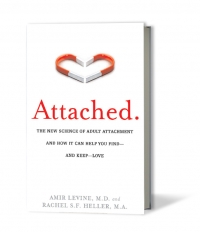Amir Levine Interview – Insights on Dating From A Psychiatrist And Neuroscientist
“Attached: The New Science of Adult Attachment”
Jasbina Ahluwalia interviews Dr. Amir Levine
A few topics Dr. Amir Levine addresses in this interview are:
- (2:53) Attachment Style: Which Are You?
- (6:14) Dependency Paradox: Healthy Dependence
- (10:30) Attachment Style of Your Partner
- (13:49) Secure Attachment Style: The Best?
- (17:27) Men Are Secure in Relationships!
- (19:56) Avoidant Attachment: Singles Mingling
- (22:17) Power of the One
- (24:45) Avoidant Attachment Style Cues
- (26:38) Secure Partner Benefits
- (30:18) Authentic Self: Be You!
_____
Dr. Amir Levine, M.D., is an adult, child, and adolescent psychiatrist and neuroscientist. He graduated from the residency program at the New York Presbyterian Hospital/Columbia University, where he is currently a Principal Investigator on a research project sponsored by the National Institutes of Health. Dr. Levine has a private practice in New York City.
_____
—> [VIDEO] Is It Bad To Have A List Of Must-Haves In Men?
_____
(00:48): Hello everyone and welcome to Intersections Match’s Talk Radio, a monthly holistic lifestyle show focused on the continual evolution into the best versions of our authentic selves. We and our guests discuss relationships and health and wellness, each of which contributes to meaningful and fulfilling lives.
This is Jasbina, your host. I’m the Founder of Intersections Match, the only elite national personalized matchmaking company focused on singles of South Asian descent nationwide in the US.
I’m very excited to welcome Dr. Amir Levine, a psychiatrist and neuroscientist, to our show today. Welcome, Amir.
Dr. Amir Levine
(1:24): Hi, it’s great to be here.
(1:26): It’s a pleasure to have you. As a professional dating coach and matchmaker to successful men and women, I’m fascinated by insights supporting people’s efforts to evolve into the best versions of their authentic selves.
I’ve enjoyed reading your book entitled, Attached: The New Science of Adult Attachment and How it Can Help You Find- and Keep- Love. I would love to explore some of the insights shared by you. Amir, what led you to write this book?
Dr. Amir Levine
(1:52): I’m so glad that we’re talking about this, especially from a dating perspective. I think that this was the main reason that led me to write this book. In all of my training as a psychiatrist and child psychiatrist, I had never really heard about adult attachment science. I didn’t know that there is a science studied for two decades now that looks at how we behave in romantic situations and relationships.
It gives a lot of answers to all of these dilemmas that we face in relationships but even more so when we’re dating. Is this the right person? Is this not the right person for me? How do I know? How can I tell if the person that I’m going out with is someone that I’m going to have a good relationship with? It turns out that there is a science behind it. You can actually tell from early on, even from the very few dates, if this is going to work out for you or not.
_____
[More from Jasbina] —> [VIDEOS] Ellen Whitehurst YourTango Video Interviews – Dating & Relationships_____
Attachment Style: Which Are You?
I find that fascinating.
Your book discusses three main styles in which people perceive and respond to intimacy in romantic relationships.
In your book, it is termed “attachment styles.” As a starting point, will you share a brief description of each of the attachment styles for our listeners?
Dr. Amir Levine
(3:15) Attachment styles are not just something in my book. This is the product of research that’s been going on. This is hardcore science.
These attachment styles were first described in children by a very famous researcher named Mary Ainsworth. It was used to describe the way that children interact with their parents.
In 1987, two researchers thought, “Maybe we have the same kind of attachment with our significant others.” The same system that’s in our brain related to how we attach to our parents is also related to how we attach to our partners.
They wanted to see if those three styles that exist in children also exist in adults.
These three styles are
- The anxious attachment style
- The avoidant attachment style
- The secure attachment style
Elaborating on Attachment Style: Which Are You?.
_____
Dependency Paradox: Healthy Dependence
(6:14): We have the anxious, secure and avoidant attachment styles. Your book discusses what you call the “dependency paradox.” Please tell us about that.
Dr. Amir Levine
(6:30): That’s very important. I’m glad that you’re asking about that.
In order to understand what attachment style you are, we have quizzes. We teach people how to learn this new language. What does it mean?
How are you able to tell what attachment style you are and what other people are?
We also have a quiz online on the book’s website that you can take in order to determine what attachment style you are.
In the book, we show you how to tell what attachment styles other people are.
In the way that I described it to you, you can see where a lot of the relationship drama lies.
Elaborating on Dependency Paradox: Healthy Dependence.
_____
[More from Jasbina] —> [BLOG] Culture Influences Love – Learn How?—> [VIDEO] When Should I Take My Relationship Offline?
—> [INTERVIEW] Dr. Christine Whelan Interview – Why Smart Men Marry Smart Women
—> [INTERVIEW] Laurie Davis Interview – Love @ First Click
_____
Attachment Style of Your Partner
(10:30): You mentioned that, when you’re out there dating, it’s very helpful to know your own attachment style and self-identify with one of them. Similarly, the ability to decipher the attachment style of your prospective partner would be important. Your book discusses what you term five golden rules for deciphering the attachment style of your partner. I’m hoping you can share some of those with my listeners.
Dr. Amir Levine
(11:07): When I saw this data, it was all found in scientific articles. It is all very useful information for people in their everyday lives but it was buried in statistics and science lingo. I thought, “If only I’d had this when I started dating.”
I realized I had to write this book. It’s so helpful for people who are dating. It really changes the game.
Elaborating on Attachment Style of Your Partner.
_____
Secure Attachment Style: The Best?
(13:59): Your book lays out in great detail these three attachment styles. You want to be able to self-identify with one of them.
In terms of deciphering the attachment style of your partner, you mentioned that people reveal themselves early on by what they say and don’t say, do and don’t do. What are some typical things you see in order to identify someone with the avoidant style?
Dr. Amir Levine
(14:35): Someone who has an avoidant attachment style, they are the people who play games. You never know where you are with them.
You go out on one date and things are very close. Then, all of a sudden, they don’t call you. We might think, “I have to give them time.”
In the process of writing this book and interviewing a lot of people who are secure, they are very easygoing. You always know where you are with them.
Elaborating on Secure Attachment Style: The Best?.
_____
Men Are Secure in Relationships
(17:27): In your book, you address those single readers who identify with the anxious attachment style. They’re reading your book and thinking, “I think I fall in this category at this time.”
What is your secret to finding a good relationship when you know that you have anxious tendencies?
Dr. Amir Levine
(17:50): There is one other thing that I forgot to mention. There is a lot of literature that mistakenly tends to equate masculinity with avoidance.
People think that all men are closed up. They’re not very emotional. They have a hard time talking about their feelings. They need to go into their man cave.
The truth is, this is really a description of someone who is avoidant.
Elaborating on Men Are Secure in Relationships.
_____
Avoidant Attachment: Singles Mingling
(19:56): There are cultural misconceptions when it comes to this. In your book, you explain why, when you’re out and about, you’re more likely to meet other singles with an avoidant attachment style. Why is that?
Dr. Amir Levine
(20:33): I love to give these examples of two patients that I had.
One had an anxious attachment style. He broke up with his girlfriend. They broke up about seven months before. He said, “I can’t stop thinking about her.” He said he thinks about her every ten minutes throughout the day.
I had another patient who had an avoidant attachment style. He broke up with his girlfriend two weeks prior to that. He said, “No, I don’t really think about her so much anymore. The last time I thought about her was last night when I went out on a date with someone else. I was wondering if I should wear the shirt that she gave me as a present.”
That shows you, people who are secures are keepers. They tend to stay in relationships for a long time.
Elaborating on Avoidant Attachment: Singles Mingling.
_____
Power of the One
(22:17): It’s so interesting that you mentioned “the one.” You call it “The power of the one.” This is one of a number of different ways in which you mention in your book how people who are avoidant tend to short-change themselves in love.
Tell us a little bit more about the power of the one. What does that mean?
Dr. Amir Levine
(22:41): There is “the one.” Then there is something that we like to call “the phantom ex.” These are two things that people who are avoidants use. These are some of the things that we teach people to listen to and watch for.
Elaborating on Power of the One.
_____
Avoidant Attachment Style Cues
(24:45): For an avoidant, the person that they are with at any point in time, the avoidant will see their flaws. That is where their focus will be so that they can push them away.
That same person, after they broke up with them, will be put up on a pedestal. They only see the positive as a means to hold anyone else back.
Dr. Amir Levine
(25:16): I’m not trying to accuse. With people who don’t feel comfortable with too much closeness, it’s very threatening to them. It’s too much.
They find ways of minimizing closeness. The more they feel that things are threatening to them, the more they will find different ways.
Elaborating on Avoidant Attachment Style Cues.
_____
Secure Partner Benefits
(26:38): The anxious-avoidant trap that you mention in your book is exactly that. It’s almost as if the secure can buffer both of those tendencies.
Dr. Amir Levine
(26:48): It’s amazing. We can change. You can become more secure if you’re with someone who is secure.
If you’re avoidant, you will become less avoidant. If you’re anxious, you will become less anxious. It’s amazing.
They will teach you. It’s like having a relationship coach built into the relationship. That’s why we tell the anxious and avoidant not to go with one another but to go with a secure.
Elaborating on Secure Partner Benefits.
_____
Authentic Self: Be You!
(30:18): I know that your book devotes a lengthy chapter to the topic of communication to ensure that your needs are met in a relationship.
Dr. Amir Levine
(30:30): It’s to ensure that your needs are met but also to be able to decipher whether or not the other person is able to meet your needs.
Elaborating on Authentic Self: Be You!
_____
Are there any last thoughts or a take-home message that you’d like to leave our listeners with beyond the great insights that you’ve already shared?
Dr. Amir Levine
(33:58): Yes. Take that attachment quiz. You can go to AttachedTheBook.com and take the quiz. You will get a sense of what attachment style you are. You will start to learn about how to tell what attachment styles other people are. It’s a game changer, I think.
(34:20): Again, the book website where you can take that quiz is AttachedTheBook.com. Thank you so much for joining us today, Amir. It’s been a pleasure.
Dr. Amir Levine
(34:33): It’s been great talking to you. Thanks a lot.
(34:36): In case you joined us late or would like to share this show with people in your life, I’d like to remind you that today’s radio show will be archived and available as a podcast on Intersections Match’s website, which is www.IntersectionsMatch.com. I can be reached at jasbina@intersectionsmatch.com. I appreciate you hanging out with us. Do email me with topics you’d like discussed in future shows. Make sure to join us for next month’s show. Take care, everyone.
_____
Tell Us:
What attachment style do you most identify with? Share with us in the comments section below.
_____





